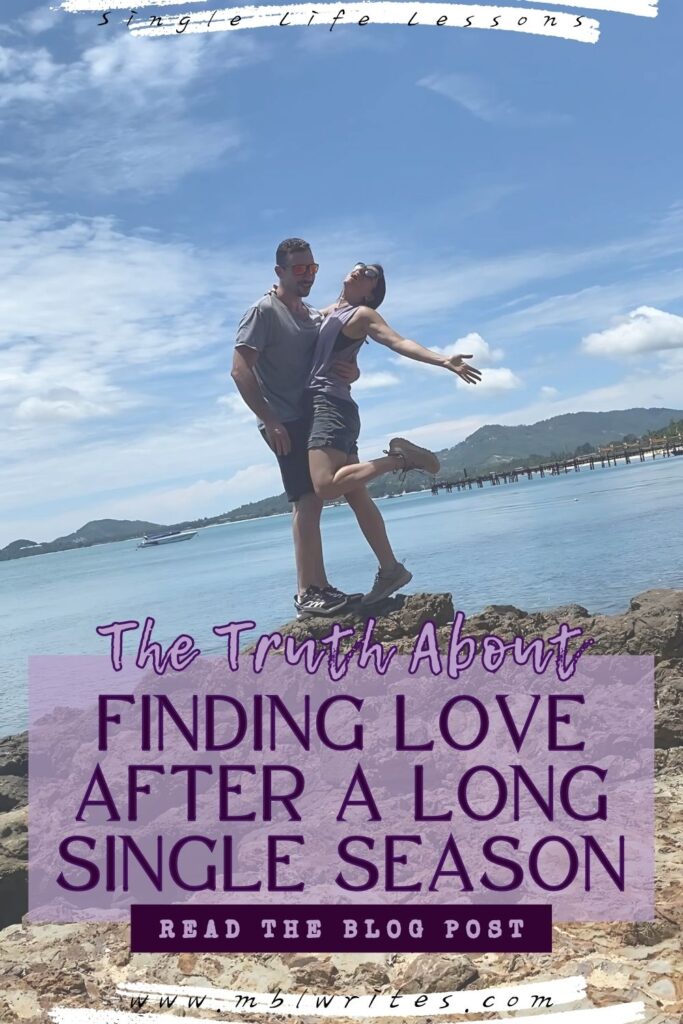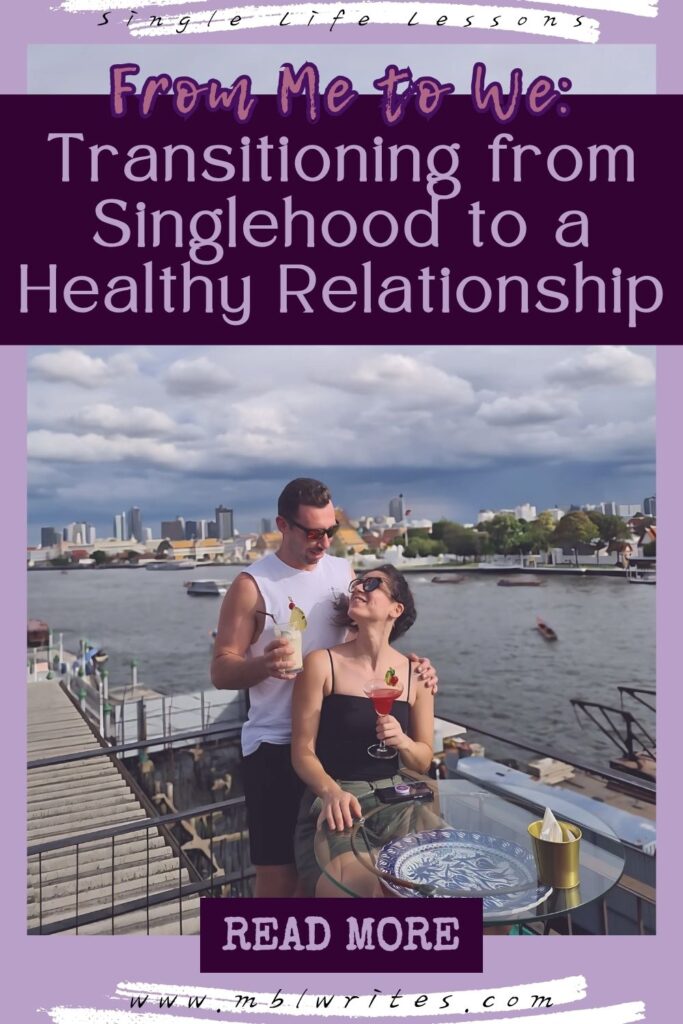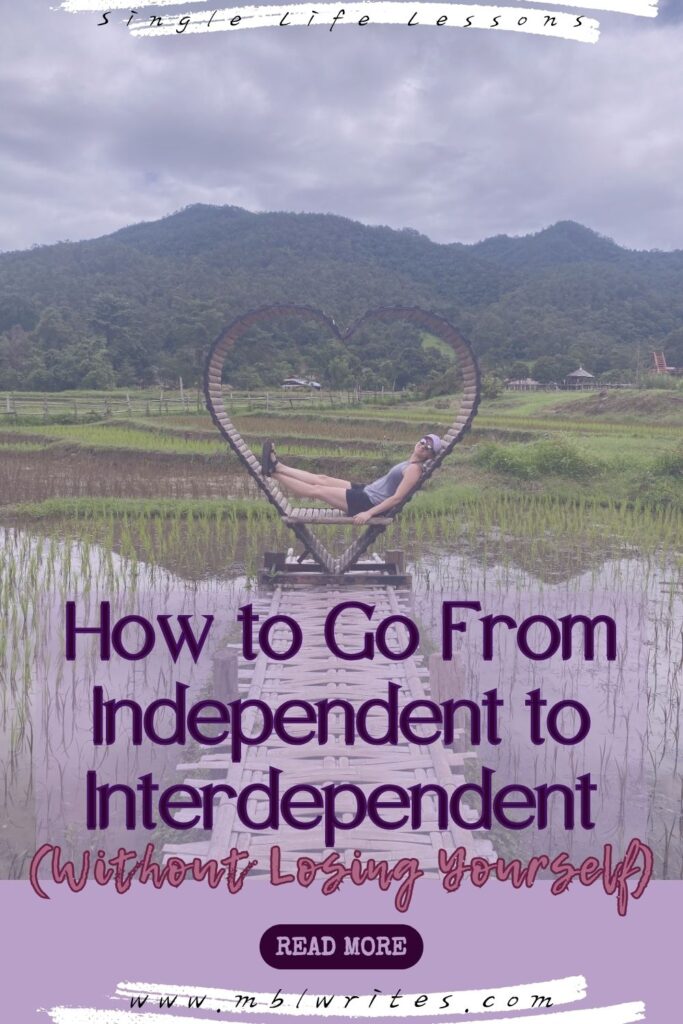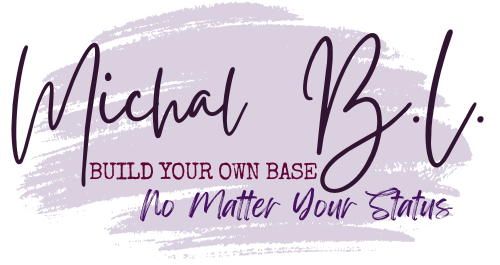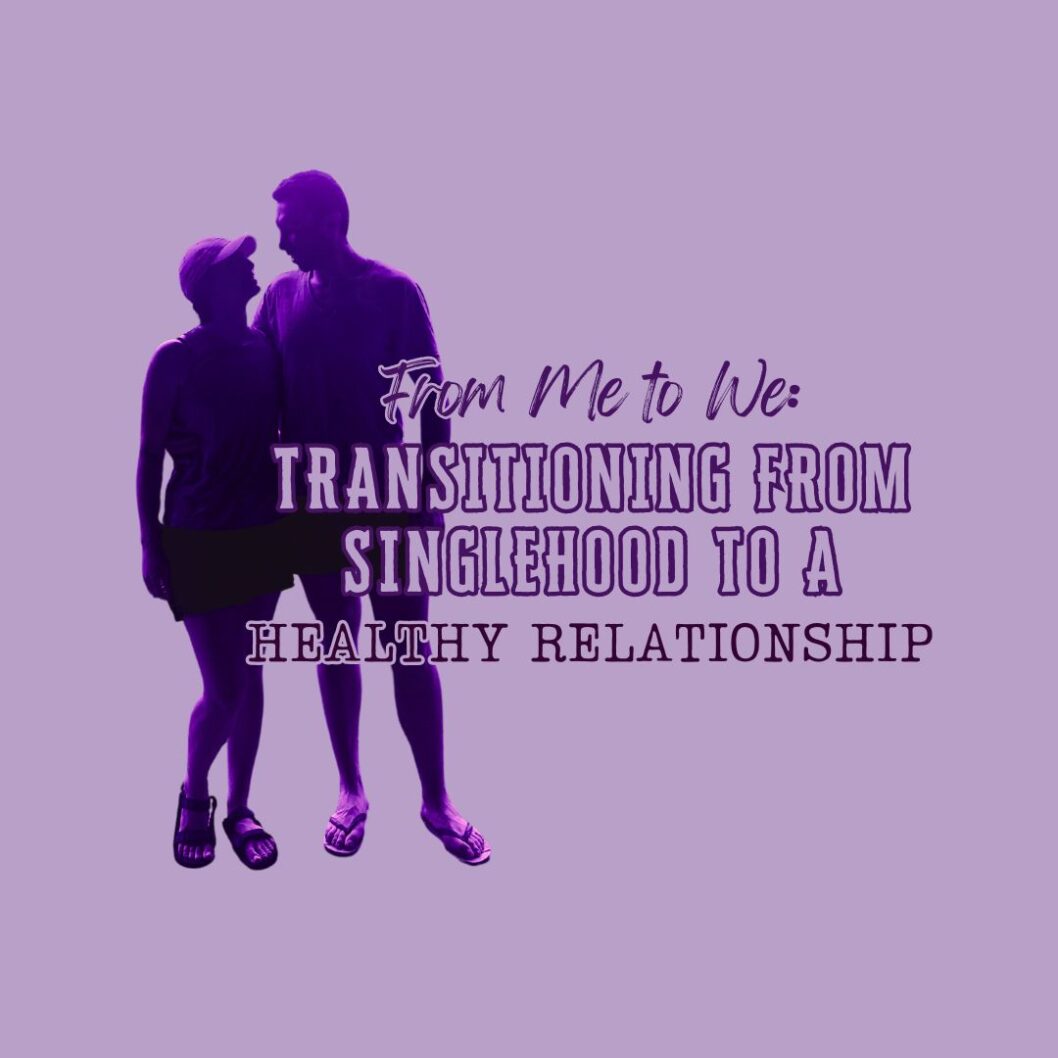
From Me to We: Transitioning from Singlehood to a Healthy Relationship
Finding love after a long single season? Here’s how to navigate the shift, from singlehood to a healthy relationship – without losing yourself in the process.
Introduction: From Solo to Shared – But Still Whole
After years of thriving on my own, I didn’t expect love to hit this way in my 30s – grounded, intentional, and honestly… kind of terrifying. The only love I knew was from my 20s, and from before my singlehood journey. While I truly enjoyed my single life, there was still a part of me that wanted and was hoping to find love. Transitioning from singlehood to a healthy relationship… Was made both much easier and much harder due to my strong self-relationship and empowering single life.
You may feel behind or unsure how to merge this chapter with your independence. You may feel excited and welcome this love you thought would never happen for you with open arms. But it can still come with fear, pressure, and the inevitable questions – “Am I doing this too late?” Or “Am I too comfortable on my own?”
This post is for you if you’ve spent years building your independence and self-worth, and are now wondering how to navigate dating and being in a relationship without giving any of that up. We’re diving into the emotional shifts, real challenges, and powerful tools to help you stay true to yourself while embracing love.
Why Finding Love in Your 30s Feels Different
Is it harder to fall in love in your 30s? No, it’s just different on every level. You no longer seek the rush and drama, so it’s more mellow love. You no longer put up with what you did in your 20s. So yeah, that may make the option pool smaller, but also more minded and focused. You’re dating with relationship goals in mind, not just hoping for the best. When you’re more focused on what you want, it’s even easier to filter out the “noise” and zero in on what’s right for you, before, during and after transitioning from singlehood to a healthy relationship. And, call it picky, but you no longer settle. You know when to stand, when to fold, and when to leave. There’s more intentionality while transitioning from single to a relationship: in how you show up, in how you seek what you want, and how you interact – or in other words, less chaos.
So, how is dating different in your 30s?
1) You’ve likely done the inner work
If you take advantage of singlehood to connect with yourself properly – you know yourself better, and you know who you are. What you want and don’t want. Your needs and non-negotiable. Your values, morals and boundaries are clear – and you stick to them. You have more self-awareness in relationships and dating. So you know who and what you’re willing to put up with, and what NOT.
When dating in your 30s, or when you find someone – you’re both more true to who you are (and present yourself better), and don’t lose yourself easily in them. You’re more at peace with yourself and your life. So you’re also calmer, less stressed in general. They also get to know you, the real you, more effectively.
2) You’ve likely built a life you enjoy
No matter your status, alone or not – you should create a life worth living. When you invest in constructing a fulfilling life while you’re still single and already love it, especially when finding love later in life – you’re not looking for someone to make you happy, or be your life. You’re sourcing your happiness from within, and fueling your joy from all the things you fill your life with.
Being content in your own life and enjoying your own company changes how you approach love and dating. You’re not seeking someone to complete you, but to complement you, which creates a healthier relationship. Less dependent. When you have a full life, you’re also more attractive, have more to share and give.
3) You’re more selective (and that’s a good thing)
Despite what everyone tells you, and how much they try to convince you… When dating in your 30s, you’re less willing to settle, but also more open to real connection. Letting just anyone in, or going out just for the sake of it – will only exhaust you, deter you from the right course, and prevent you from focusing on what really matters. Both in your life and in navigating new relationships in your 30s.
You know it requires compromise – and you now also know when and how to do so. There’s often less societal pressure because you’ve learned to filter them out (and know they’re not in your best interest). But more internal questions: “Is this the right person? Is it worth changing my life?” – which is a good thing, because it means you’re being more calculated with who you let in. And also being open-minded, not just giving up without giving a chance.
4) You’ve accepted yourself and your life alone
Perhaps you even said goodbye to the option of ever finding love. Being single in your 30s, especially if you’ve been single for a while, can cause you to feel like it just won’t happen. Not for you. Right? Not in a bitter way, but in a real one. Perhaps at first you felt sorry for yourself, but with time you learned to embrace what is, not what isn’t. You made peace with your status, and made it into a life worth living – no matter how long it lasts.
I’ve also accepted that I’ll probably be single forever, and while I still had that tiny spark of hope deep inside me… I also made peace with it. I built a fulfilling life for myself, and I learned how to love it and love myself. So when I did find love, I had a much bigger appreciation for it. In a way, it’s even better than falling in love in your 20s. Because you don’t take it for granted, and you just focus on what matters most. It’s a huge part of why I just get caught on the small, petty things. Why I just allow myself to love and enjoy.
The Emotional (and Practical) Challenges of the Shift – From Independent to Interdependent
Adjusting to a relationship after being single, is not just about letting someone in after doing it all solo for so long. It’s also about feeling vulnerable again after being so self-reliant. And the fear of losing your independence or identity, while transitioning from singlehood to a healthy relationship. Vulnerability after singlehood can feel scarier when you’ve spent years emotionally self-sufficient. Not only because you’re letting someone in again (which can lead to potential heartbreak). But also because you’re letting go of a part of yourself, and may even fear losing yourself again in a relationship. Just because that’s how you used to be, doesn’t mean you’ll be like that again now. Once you do the work, you’re less likely to lose your independence in a relationship. And more likely to continue maintaining it – and finding healthy ways of balancing independence and partnership.
So, what are the challenges of finding love in your 30s?
1) Feeling the pull between “freedom” and “togetherness”
First, you need to “give up” a portion of your freedom. You can no longer focus entirely on yourself, your wants and needs. Now you also need to take someone else into consideration, and while it’s a nice feeling to have someone to pay attention to… It can also be a struggle, and even feel like an invasion. Which is why you shouldn’t do it all at once. Take it one step at a time, and ease into it.
One of the reasons you may feel “picky” when dating is that you struggle to let go of the freedom singlehood provides. Doing things your own way, being set in your routines, without anyone getting in your way. Why should you if it helps you thrive, right? And why should you give it up for just anyone? Just for the sake of a relationship? But here’s the thing – with the right person, you don’t have to let your freedom go. At least not entirely. Yes, there are some limitations, but if done right, there’s also a lot of freedom to continue to navigate your life towards fulfilment. Together, you find the best balance for both of you, between having your individual freedom and creating a new type of freedom together.
2) Navigating closeness when you’re used to doing things alone
Second, you need to let them in and allow them to give you a hand. It doesn’t mean you’re allowing them to do things for you, or entirely leaning on them. Nor should you grant them your control. It means you’re allowing someone to show up, assist you, share with you, and do things together. Gradually letting each other into your separate bubbles, and merging parts of them together, while keeping others to yourself.
Transitioning from single to a relationship means letting go of doing everything alone and for yourself. For better or for worse. You’ve worked so hard to be strong and independent, right? An integral part of embracing singlehood is learning how to turn it into your superpower. So, how can you not assume that sharing it now with someone else makes you less self-sufficient? It’s only natural to feel overwhelmed by compromise or emotional closeness. And worry about allowing someone else to support and be there for you. Letting someone get close to you, and be there for you… Requires you to release the idea that needing someone makes you weak.
3) Letting someone into a life you’ve had full control over
Third, it’s making space for them in your schedule and physical surroundings. Whether it’s learning to manage your time better, making compromises or finding space in your jam-packed routines. It’s not about giving up your time and quitting things for them. Nor should you clear up your entire space to make it both of yours, instead of just yours. It’s about finding the best ways of integrating, without entirely merging your lives.
While having full control of your life and space is stabilising… There’s also something grounding about having someone by your side. Not to take over, but to be your copilot, and yes, also sometimes grab the wheel for or with you when you need them to. To do this, you need to make space in your life (and heart) for someone else, without crowding yourself out. The pressure to “make room” for someone after years of being enough for yourself can feel overwhelming, especially with everything else going on in your life. But a healthy relationship doesn’t rush this – it takes its time, and makes space one small piece at a time.
Maintain Your Self-Relationship After Finding Love
The work doesn’t stop when you find love, and if anything, it gets even more complex. Your self-relationship needs just as much attention, especially during the transition from singlehood to a healthy relationship. And now that you’re in a relationship, you need to get more creative to not only continue working on it, but also not lose yourself and your individuality in your partner.
So, how can you ensure you don’t lose yourself in a relationship?
- Maintaining time alone – Whether on your hobbies, self-care activities, or solo dates. Find ways to still fit in your quality alone time, so you don’t feel like any free time you have automatically goes to your partner.
- Emotional check-ins – Ask yourself how you’re doing. What are you feeling? What’s going on with you? What feels on and what feels off? When and how did this feeling start? When you always know the answers to these questions, it’s much harder to lose track and sight of yourself.
- Giving each other space – Whether it’s each doing your own thing alone or with your friends. Just because you’re together, doesn’t mean you ALWAYS have to be together. In fact, a relationship that takes time apart and doesn’t spend every waking moment only with each other, is much healthier.
For a full guide on how to stay grounded in who you are while building a healthy relationship, read my blog post: How to Maintain Your Self-Relationship & Individuality When You’re in a Relationship
What a Healthy, Grown-Up Relationship Actually Looks Like
Whether or not you’ve found your person, this is all about recognising the signs of secure, mature love in your 30s. Whether you’re already transitioning from singlehood to a healthy relationship or are in the process of dating. Real love in your 30s isn’t about drama – it’s about depth, security, and staying yourself. You not only encourage yourself to maintain your self-identity in your relationship, but you also encourage each other. Which makes balancing independence and partnership that much easier.
So, what are the signs of a healthy transition from singlehood to partnership, and a healthy relationship?
1) Mutual respect
Whether it’s for each other’s time, space, dreams or identity – honouring each other’s needs is an integral part of maintaining individuality in a relationship. You’re relationship is healthy because you’ve both ‘done the work’. And you both now appreciate your time alone, your space and your independence. So you not only ‘demand’ respect for yours, you also provide respect for theirs. It’s a mutual give and take, without resentment, and filled with encouragement, support and cheering each other on.
2) Secure communication
To achieve this mutual respect while transitioning from single to a relationship… It requires open, honest, and non-defensive, non-controlling communication. This means you’re open and willing to hear them out, without judgment, flipping the script or getting defensive. This also means you’re not speaking with blame, accusations, or only thinking of yourself. And, of course, this goes both ways. You both can be vulnerable, share what’s on your mind, and discuss the other’s actions or words, without worrying that it will become dramatic. Because if something is said – it’s not to hurt, it’s to learn and grow.
3) Emotional safety
When you’re navigating new relationships in your 30s, and trying to create this secure communication… You’re unsubscribing from anything that’s so emotionally unstable – you have no idea how messy it will get (but you know it will). This means you’re not willing to play games or put up with someone who is. It means you’re being true to yourself, honest with them and not speaking in hints, expecting them to just get it or understand. Both of you are speaking directly, not just getting confused and miscommunicating while trying to read between the lines. There’s no longer a need for guessing or assuming what the other feels – because you share it straight, as it is. And you give each other the security to do so.
4) A sense of peace and stability – not chaos or intensity
Adjusting to being in a relationship after being single is not just about letting go of singlehood habits. It’s also about importing your single life mindset into your partnership. Singleness provides a sense of tranquillity, because it’s drama-free and you no longer seek the ‘action’ and ‘sparks’. There’s no reason why you can’t maintain that mentality in your relationship life. In fact, if you want to attain all of the above, you need to strive for handling conflict with maturity, not avoidance or escalation, and not with ego or unnecessary melodrama. It may sound ‘boring’, but it makes so much more space for better things.
5) Shared values
You cannot manage any of this if you vibe on completely different wavelengths. Embracing love after prolonged singlehood is only possible if you find ways to connect through your fundamental beliefs. If your morals clash, it will be much harder to create a harmonious relationship that doesn’t require constant bridging. Yes, you should make room for different interests and opinions – but certain things just have to align. Especially when creating a household together, and on crucial topics like managing finances and lifestyle choices (like going out, restaurants and bars, partying, spending/splurging, living large or minimal).
6) Encouraging each other
The key to maintaining individuality in a relationship is the encouragement of personal growth and independence. This not only boosts and inspires you to grow as individuals, but also as a couple. A good relationship should strengthen your connection both with yourself and one another, while making you feel more like you, not less. In a healthy relationship, you not only allow each other to thrive, you also push one another to do so. And when you’re maintaining all of the above, it helps you in building a relationship that supports who you are.
To sum it all up – while transitioning from singlehood to a healthy relationship, you want to make sure that you’re not just falling into it and hoping everything else will also fall into place. You need to actively curate and work on a relationship that complements your life, not consumes it. This often requires you to reflect on what you want, and set proper relationship goals that align with you.
Tips for a Smooth Transition From Single to Relationship Life
Whether you’re already transitioning from singlehood to a healthy relationship, or still on your journey of finding love in your 30s… These tips will help you understand how to adjust to a relationship after being single, maintain individuality in a relationship and navigate dating and new relationships in your 30s.
1) Ease into it, and progress steadily
I get it, it can be all-consuming and exciting, especially if you’ve been single for a while. But jumping all in, all at once and too fast, can cause whiplash. It lacks control and is the fast lane to losing your self-identity in relationships. And it can put strain on your new, still in diapers, relationship. You don’t have to give up everything at once, no need to merge everything overnight. Take it just one, small step at a time – particularly if you’re used to being alone and doing your own thing. If they’re the right person, they’ll want to ease into it and grow gradually as well.
2) Keep nurturing yourself
A new relationship, or even in the dating stage, requires a lot of subsistence and attention. Which is a good thing, you should take your time and give energy to building a healthy relationship. But you shouldn’t neglect yourself in the process. Continue to sustain your confidence and routines. Keep doing the things that make you feel grounded and connected to you. Preserve your passions and routines alive, the things that give your drive – even the silly solo ones.
3) Let love complement you, not complete you
Embracing love after prolonged singlehood is about adding to yourself and your life, not replacing parts of it and you. Let your partner be an expansion to your life – not become your whole life, and not consume every aspect of it. They don’t need to be a part of every hobby, friendship, outing, travel or routine. Nor do you need to be a part of theirs, and nor should you give up things because you can’t do them together.
4) Don’t filter yourself or words
Don’t just spew things at them or release it all uncontrollably. But also don’t hold yourself back because you’re scared of their reactions. Don’t diminish what you’re feeling. And certainly don’t let them extinguish you. Communicate openly and calmly about alone time, identity, needs and even fears. Be true to who you are, and let them express themself as they are as well – as long as it’s not harmful.
5) Check in with your identity
If you want to maintain your individuality in your relationship, or in dating, and not lose your self-identity in relationships… You need to regularly ask yourself: who am I becoming in this relationship? Am I doing this because it’s true to me, or them? It’s okay to compromise, but are you losing sight of yourself in them? Set emotional check-ins, both with yourself and your partner. Things are constantly evolving, moving forward and changing – and if you don’t take a step back to reflect, you’ll become a stranger to yourself and your partner.
Remember: being loved doesn’t mean abandoning your freedom, nor are you abandoning the fulfilling life you’ve worked so hard to build. It’s not ‘me vs. we’ – it’s ‘me and we’
Conclusion: You Don’t Have to Lose Yourself to Love
This transition from single life to relationship life can feel both exciting and disorienting. It’s okay to get lost a bit, lose your balance and feel a bit shaky. This is an inevitable part of the process. And it’s natural to experience it when going through such major life changes. The trick is not to let it consume you entirely, and take you for a whirlwind. Find your footing on these new grounds while still anchoring to yourself. If you do the work while single, the transition, while still complex, won’t overly consume you. At least not for an irregular amount of time.
Finding love in your 30s, especially after thriving on your own, is a brave and beautiful shift. You’ve built a solid foundation in singlehood, and that’s exactly what helps you build a strong, aligned, and healthy relationship. You don’t have to sacrifice who you are to make love work, nor should you agree to. Transitioning from singlehood to a healthy relationship is never simple, but your single life helped you become the person who was ready for real love – now you get to share that person with someone else.
Stay safe, stay healthy and stay strong!
Michal B.L.
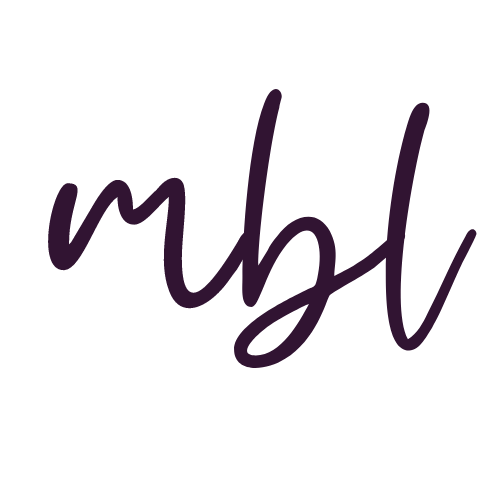
If you enjoy my content, please consider supporting me so I can keep writing helpful, empowering posts for singles!

Please share, pin and spread the love 🙂
